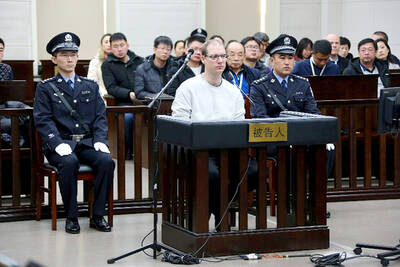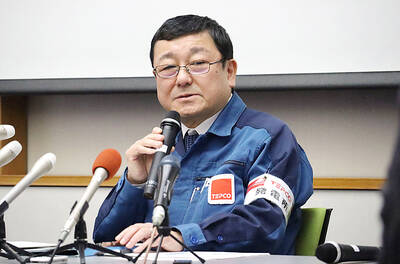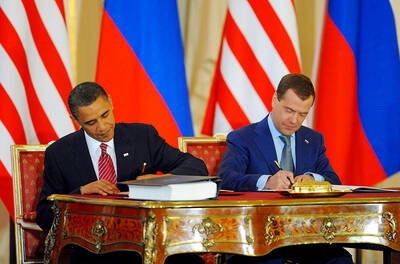
China has overturned the death sentence of Canadian Robert Schellenberg, a Canadian official said on Friday, in a possible sign of a diplomatic thaw as Canadian Prime Minister Mark Carney seeks to boost trade ties with Beijing.Schellenberg’s lawyer, Zhang Dongshuo (張東碩), yesterday confirmed China’s

NEW RULES: There would be fewer school days, four-day workweeks, and a reduction in transportation services as the country battles a crisis exacerbated by US pressure
The Cuban government on Friday announced emergency measures to address a crippling energy crisis worsened by US sanctions, including the adoption of a four-day work week for state-owned companies and fuel sale restrictions.Cuban Deputy Prime Minister Oscar Perez-Oliva Fraga blamed Washington for the

A sign hanging from a rusty ice-green shipping container installed by Thai forces on what they say is the border with Cambodia reads: “Cambodian citizens are strictly prohibited from entering this area.”On opposite sides of the makeshift barricade, fronted by coils of barbed wire, Cambodians lamente

A minuscule snail once thought to have disappeared has been saved from the edge of extinction, a British zoo said yesterday. The greater Bermuda land snail had not been spotted for years until a cluster of shells was caught slithering through an alleyway in Hamilton in 2014.Some were flown to Cheste

In a Minneapolis apartment, the curtains are drawn and a table with four computers and three children make a crude substitute for a classroom.Esmeralda, Kevin and Carlos have stopped going to school — at least physically — in the weeks since US immigration agents surged into the Midwestern city.“If

Thousands of mourners yesterday gathered in Islamabad to start burying the 31 killed in a suicide bombing at a Shiite Muslim mosque, as residents expressed concern that there could be further attacks.A man opened fire at the Khadija Tul Kubra Imambargah compound on the outskirts of Pakistan’s capita

SHOW OF SUPPORT: The move showed that aggression toward Greenland is a question for Europe and Canada, and the consequences are global, not just Danish, experts said
Canada and France, which adamantly oppose US President Donald Trump’s wish to control Greenland, were to open consulates in the Danish autonomous territory’s capital yesterday, in a strong show of support for the local government.Since returning to the White House last year, Trump has repeatedly ins

Japan would switch the world’s largest nuclear power plant back on next week, after a glitch with an alarm forced the suspension of its first restart since the 2011 Fukushima Dai-ichi nuclear power plant disaster.Takeyuki Inagaki, the head of the Kashiwazaki-Kariwa nuclear power plant run by Tokyo E

Jeremiah Kithinji had never touched a computer before he finished high school. A decade later, he is teaching robotics, and even took a team of rural Kenyans to the World Robotics Olympiad in Singapore.In a classroom in Laikipia County — a sparsely populated grasslands region of northern Kenya known

Two medieval fortresses face each other across the Narva River separating Estonia from Russia on Europe’s eastern edge.Once a symbol of cooperation, the “Friendship Bridge” connecting the two snow-covered banks has been reinforced with rows of razor wire and “dragon’s teeth” anti-tank obstacles on t

Architect Buse Ceren Gul is on a mission: Restore a 166-year-old Greek Orthodox church that was long a beacon of her hometown’s multicultural past. She believes restoring the church left mostly in ruins by the earthquakes in southern Turkey three years ago would help locals reconnect to their city.T
HELP: A reported sanctions lift on assistance to North Korea would allow groups to provide humanitarian aid, such as supplements and medical equipment
A senior South Korean official yesterday said “new progress” on North Korea could come within days, with a local report saying the administration of US President Donald Trump has decided to approve humanitarian sanctions exemptions for Pyongyang.Seoul has made considerable efforts to bring North Kor

NO GO: Washington wants Beijing to join the pact, but although China said it regrets the expiration of the treaty, it has balked at any restrictions on its growing nuclear arsenal
The last remaining nuclear arms pact between Russia and the US expired yesterday, removing any caps on the two largest atomic arsenals for the first time in more than a half-century.The termination of the New START Treaty could set the stage for what many fear could be an unconstrained nuclear arms

Italy has thwarted a series of Russian cyberattacks targeting the Milan-Cortina Winter Olympics, the Italian minister of foreign affairs said on Wednesday.The attacks were “on foreign ministry offices, starting with Washington, and also some Winter Olympics sites, including hotels in Cortina,” Itali

As countries step up their use of Internet shutdowns to muzzle dissent, some are also taking advantage of the blackouts to increase censorship firewalls, Internet privacy company Proton said.Proton, known for its encrypted e-mail and virtual private network (VPN) services, has for years observed how

POLITICAL CLIMATE: The Shinawatras’ grip on power is faltering, while a wave of nationalism from a border conflict has bolstered support for Bhumjaithai
Thai Prime Minister Anutin Charnvirakul is widely expected to remain the country’s head after this weekend’s general election, regardless of the result.His Bhumjaithai Party came third in the last vote, but Anutin — who championed Thailand’s decriminalization of cannabis — became prime minister in S

The first permanent Pokemon theme park opened in Tokyo yesterday, featuring cute rides and a woodland area where visitors can try and “catch ’em all.”It is Japan’s latest tourist attraction catering to a record influx of overseas travelers, and tickets are already sold out for the next two months.Vi

Four astronauts could blast off to the International Space Station (ISS) next week after setbacks — including a mysterious medical evacuation of the previous crew, last-minute rocket problems and some scheduling conflicts with NASA’s moon mission.The crew was scheduled to launch on Wednesday next we

OPERATION ‘HEROF’: The government sent helicopters and drones to eject militants from a town in Balochistan, in the largest attacks ever by insurgents in the province
Pakistan’s security forces used drones and helicopters to wrest control of a southwestern town from separatist insurgents after a three-day battle, police said yesterday, as the death toll in the weekend’s violence rose to 58.Saturday’s wave of coordinated attacks by the separatist Baloch Liberation

KENNEL CLUB: More than 3,000 dogs from 17 nations competed, with four-year-old Penny becoming the fifth doberman to win the top prize at the US show
Penny, a four-year-old Doberman pinscher, on Tuesday won Best in Show at the Westminster Kennel Club dog show, capturing the most prestigious dog show prize in the US. Penny cut a majestic stance in the final round of judging, when the finalists of seven groups competed at New York City’s Madison Sq
